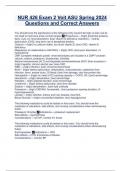NUR 426 Exam 2 Voit ASU Spring 2024
Questions and Correct Answers
You should know the significance of the following (why would it be high vs low), but do
not need to memorize know normal ranges ✅Phosphorus→ (high) foods like proteins,
dairy, nuts, inc renal absorption; (low) vitamin D deficiency (calcitriol) → kidney
dysfunction (CKD), long term use of phosphate binders
Calcium→ (high) inc calcium intake, too much vitamin D; (low) CKD, vitamin D
deficiency
Magnesium (in relationship to AKI/CKD)→ (high) CKD; (low) poor absorption, r/t
hypokalemia
CMP (complete metabolic panel)- what electrolytes are included in a CMP? (answer:
calcium, sodium, potassium, bicarbonate, chloride)
Alanine transaminase (ALT) and Aspartate aminotransferase (AST) (liver enzymes)→
(high) hepatitis, chronic alcohol use; (low) CKD
WBC→ (high) infection; (low) immunocompromised
BUN→ (high) kidney dysfunction, dehydration, corticosteroids, catabolism from
infection, fever, severe injury, GI bleed; (low) liver damage, very low protein diet
Hemoglobin→ (high) inc need of O2 carrying capacity→ COPD, HF; (low) hemorrhage
Hematocrit→ (high) dehydration; (low) hemorrhage
Platelets→ (high) platelet disorder; (low) hemorrhage
Creatinine→ (high) kidney dysfunction; (low) liver disease
Sodium→ (high) dehydration ; (low) fluid overload
Potassium→ (high) CKD/AKI, furosemide ; (low) potassium sparing diuretics, r/t
hypomagnesemia
Lactate→ (high) infection, kidney and liver disease; (low) N/A
Blood Glucose→ (high) uncontrolled diabetes; (low) hypoglycemia
The following medications could be tested on this exam. You should know the
medication's indications, side effects, and nursing considerations when administering
these:
Potassium Chloride ✅Indications→ potassium replacement
Side effects→ dysrhythmias
Considerations→ not IVP, monitor K+ levels
The following medications could be tested on this exam. You should know the
medication's indications, side effects, and nursing considerations when administering
these:
Erythropoietein ✅Indications→ CKD
Side effects→ HTN, thrombosis at fistulas
Considerations→ monitor BP
,The following medications could be tested on this exam. You should know the
medication's indications, side effects, and nursing considerations when administering
these:
Renvela (Sevelamer) ✅Indications→ phos binder for CKD
Side effects→ hypophosphatemia (long-term)
Considerations→ monitor bicarb and chloride levels
The following medications could be tested on this exam. You should know the
medication's indications, side effects, and nursing considerations when administering
these:
Baclofen ✅Indications→ muscle spasms
Side effects→ muscle relaxation, toxicity, drowsiness, sedation, diaphoresis
Considerations→PO, for larger does (severe spasm) needs a pumps (intrathecal
catheter)
The following medications could be tested on this exam. You should know the
medication's indications, side effects, and nursing considerations when administering
these:
Botulinum toxin A ✅Indications→ muscle spasms, spastic CP
Side effects→ temporary weakness
Considerations→ inc need for botox over time, lasts 3-6 mo, peaks at 2 weeks
The following medications could be tested on this exam. You should know the
medication's indications, side effects, and nursing considerations when administering
these:
Diazepam ✅Indications→ seizures, anxiety
Side effects→ CNS depression, drowsiness
Considerations→ monitor BP and RR, flumazenil reversal agent
The following medications could be tested on this exam. You should know the
medication's indications, side effects, and nursing considerations when administering
these:
Furosemide ✅Indications→ antihypertensive, edema, HF
Side effects→ voiding, hypokalemia
Considerations→ potassium supplements, monitor BP
The following medications could be tested on this exam. You should know the
medication's indications, side effects, and nursing considerations when administering
these:
Insulin ✅Indications→ hyperglycemia
Side effects→ hypoglycemia, hypokalemia
Considerations→ monitor potassium
The following medications could be tested on this exam. You should know the
medication's indications, side effects, and nursing considerations when administering
these:
, Dextrose ✅Indications→ hypoglycemia, adjunct for DKA tx
Side effects→ raise blood glucose levels
Considerations→ monitor blood glucose
The following medications could be tested on this exam. You should know the
medication's indications, side effects, and nursing considerations when administering
these:
Acetaminophen ✅Indications→ mild pain, fever
Side effects→ drowsiness
Considerations→ liver damage
The following medications could be tested on this exam. You should know the
medication's indications, side effects, and nursing considerations when administering
these:
Tacrolimus ✅Indications→ prevention of organ transplant rejection
Side effects→ immunosuppression
Considerations→ monitor BP (HTN), renal/hepatic function
Disease function of cerebral palsy (CP) ✅-CP→ change in developing brain,
permanent, non-progressive, not curable
-considered static encephalopathy (static in nature)
-brain anomaly does not change nor get worse, but symptoms changes with
development over time
-ex. Muscle spasticity can get better, worse, or remain the same
-Causes
-premature <28 wks
-VLBW, LBW
Idiopathic
Pre-birth→ infection (chorio), toxic exposure, brain abnormalities
Birth→ traumatic birth, long labor-brain damage (O2 deficits), stroke, bradycardia
After birth→ kernicterus (jaundice after birth), shaken baby syndrome, bacterial
meningitis, multiple births, hypoxia, seizures
Spastic CP ✅-Spastic→ inc tone (most common)
-inc muscle tone, hyperreflexive clonus
-tight and flexed
-Types of spastic CP
-tetraplegia→ 4 limbs, cognitive deficits common here; likelihood of epilepsy and EPS
abnormalities
-diplegia→ 4 limbs (LE>UE)
-triplegia→ 3 limbs
-monoplegia→ 1 limb
-hemiplegia→ ½ side of body
Dyskinetic CP ✅-Dyskinetic→ fluctuating tone-abnormal movements, posture, and
coordination




